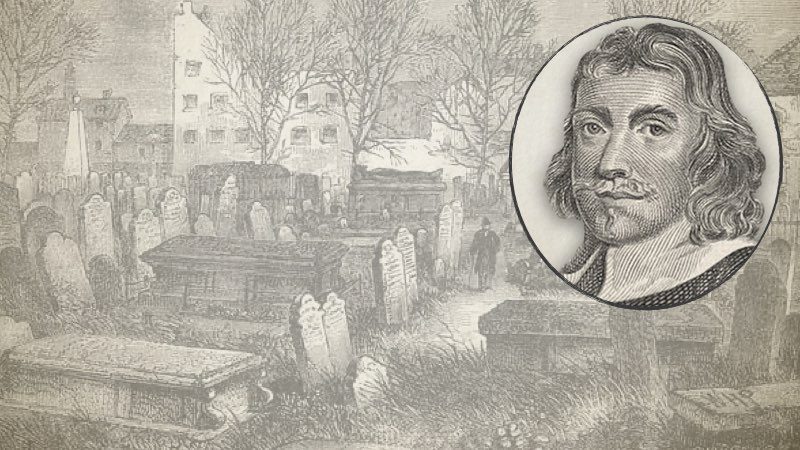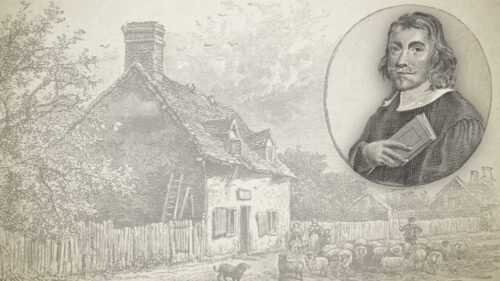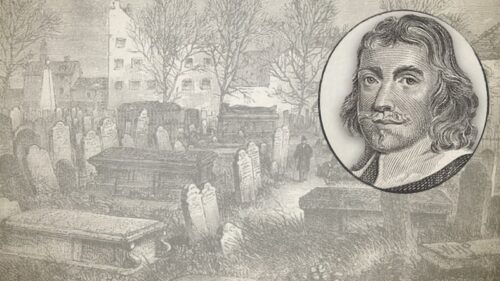
Bi-Centenary Of The Death Of John Bunyan
Earthen Vessel, 1888:
Much of the liberty we now enjoy as Christians is owing to two great historical facts which transpired in the years 1588 and 1688—the defeat of the Spanish Armada, and the accession of the Protestant dynasty to the throne of England. We, however, dare not withhold at the present moment stating our firm conviction that the iron hand of
ROMANISM WILL YET AGAIN PREVAIL
and reign in this country, at least for a limited period. It is not difficult to imagine what the state of England would be if the sacred Scriptures were as rigidly forbidden to be possessed and read by the public as they were in the Middle Ages. God defend the right.
JOHN BUNYAN’S DEATH, AUGUST 12TH, 1688.
We owe a great debt of gratitude to God, and to the memory of the glorious old Bedford Dreamer, John Bunyan, whose immortal spirit passed to the regions of untold bliss on the 12th of August, 1688, just two hundred years ago. His happy departure from the “City of Destruction” to the “New Jerusalem” was indeed a blessed one. His soul, as a writer observes, “having been all along there, in holy contemplation, pantings, and breathings after the hidden manna and water of life, as by many holy and humble consolations expressed in his letters to several persons in prison.” He died at the house of his London friend, Mr. Straddock, a grocer, at the “Star,” on Snow Hill, aged 60 years.
Who has not read with delight his marvelous experience as recorded in his autobiography, “Grace Abounding”?
HIS PRISON THOUGHTS—THE “PILGRIM’S PROGRESS.”
A few years ago John Bunyan’s good name was shamefully abused by certain Roman Catholics, consequent of the supposed discovery made by Miss Cust that he (Bunyan) was simply an impostor, and not the author of the “Pilgrim’s Progress,” which forced us to publish a small work upon the subject in 1874.
The “Pilgrim’s Progress,” by which John Bunyan is so well known to-day, was thought out (at least the first part of it) during his incarceration in the miserable “Den” over the river Ouse, as he tells us in the commencement of his “Progress.” But here he found rest to be sweet, as did his contemporary sufferer, Richard Lovlace, who composed within the walls of Westminster Gatehouse a sweet song, “To Althea, from Prison.”
“Stone walls do not a prison make,
Nor iron bars a cage;
Minds innocent and quiet take,
That for an heritage.”
This famous work of the Bedford Baptist preacher has stood the test of criticism for two centuries past. There is no presumptive evidence existing to prove that the work was not entirely his own, as he faithfully tells us in the annexed curious lines prefixed to his “Holy War”:—
“It came from mine own heart, so to my head,
And thence into my fingers trickeled;
So to my pen, from whence immediately,
On paper I did dribble it daintily.”
These lines terminate with an anagram, made, says a writer, “in noble contempt of orthography”:—
“Witness my name; if anagram’d it be,
The letters make Nu hony in a B.”
TRUTH SHALL PREVAIL
The author of the “Pilgrim’s Progress” has been suspected of plagiarism, and is held up to scorn as a mere copyist. In the preface of The Booke of the Pylgremage of the Sowle, translated from the French of Guillaume de Guileville, edited by Miss Catherine Isabella Cust (1859), the writer remarks that “the twilight in which the early Christians walked was twilight still in the days of De Guileville; its shadows were unremoved in the time of John Bunyan; and if we are nearer to the dawn, the difference is, as yet, scarcely perceptible.”
There were pirated editions of the “Pilgrim’s Progress” published by Bradyl, none of which are known to be extant. The so-called third part, first printed in 1692, and of which a sixth edition appeared in 1705, is a spurious and contemptible production.
In Bunyan’s own time it appears that a certain class of persons had strong misgivings about the genuineness of the tinker’s real literary talent and inventive genius. But the “Pilgrim’s Progress” was undoubtedly the “child of John Bunyan’s own fancy,” as Dr. Adam Clarke writes, and as the well-known lines appended to his “Holy War” indicate—
“Some say the Pilgrim’s Progress is not mine,
Insinuating as if I would shine.
In name and fame, by the work of another.”
Dr. A. B. Grosart thinks that “John Bunyan’s immortal ‘Holy War’ (1682), second edition only, if second to his ‘Pilgrim’s Progress,’ also shews reminiscence of the “Purple Island,” written by P. Fletcher, B.D., and published in 1633. Dr. Adam Clarke expressed an opinion for which he produced no proof, i.e., that the plan of Bunyan’s “Pilgrim’s Progress” and “Holy War” were very similar to Barnard’s religious allegory called “The Isle of Man; or, Proceedings in Manshire,” published in 1627. Also, this great man considered that Spencer’s “Faery Queene” gave birth to the work in question!
The most likely work we know of that may have suggested to Bunyan’s mind the subject matter of his immortal dream is the book he possessed in early life, namely, “The Plain Man’s Pathway to Heaven,” a copy of which we saw, a short time since, in the library of our kind friend, Mr. E. C. Sayer, of Ipswich. It is a wonder that good old Dr. Thos. Fuller’s “Holy War,” published in 1638, has not been held np as the prototype of Bunyan’s more popular book, simply because the titles are similar.
GRACE MADE JOHN BUNYAN HONEST
Bunyan seems to have laboured continually under a certain apprehension that the reading public thought his published works were not the real fruit of his own heart and brain, assisted only by the divine power of God. We find in one part of his work he says: “I dare not presume to say that I know I have hit right in everything; but this I can say, I have endeavoured so to do. True, I have not for these things fished in other men’s waters; my Bible and Concordance are my only library in my writings.”
We have ample testimony, in the whole of his sixty books which he composed, that his natural powers were of no common order, and, as recipients of influence, “they qualified him to be either a wide wasting plague or a general blessing.” George Doe, who wrote “The Smuggler,” which was published in the first folio edition of Bunyan’s collected works, 1692, tell us that the “Pilgrim’s Progress,” in his day, “had been printed in France, Holland, New England, and in Welsh, and about a hundred thousand in England.”
BUNYAN AND HIS PRISON FRIEND, THOMAS MARSOM
One of the very individuals of the little captive group incarcerated in the Bedford “Den” was Thomas Marsom. He was the man who, we are told, “frequently stated to his family that when Bunyan had finished the manuscript of the first part of the ‘Pilgrim’s Progress,’ he read it to his fellow-prisoners with a view of obtaining their opinion as to its publication. The singular descriptions of some of the characters introduced very much disturbed the gravity of his auditors, and at the first reading some of them doubted the propriety of printing it.
“Some said, ‘John, print it’; others said, ‘Not so’; Some said, ‘It might do good’; others said, ‘No.'”
But on reflection, Mr. Marsom requested permission to take the manuscript into his own cell, to read it quietly alone-fancy the first reader of the ‘Pilgrim’s Progress’—and on this perusal he discovered its value, and strongly advised Bunyan to print it. Bunyan accordingly fell in with the advice of his friend, and printed it, and thus, by this agreeable act, he did more through the grace of God, to immortalize his name than he did by the composing of all the rest of his other works besides.
We cannot but blame the amiable Christian poet Cowper for withholding Bunyan’s name in his poem entitled Tirocinium:—
“Ingenious dreamer, in whose well-told tale,
Sweet fiction and sweet truth alike prevail.
I name thee not, lest so despised a name,
Should move a sneer at thy deserved fame.
Revere the man whose PILGRIM marks the road,
And guides the PROGRESS of the soul to God.”
We pity the author of the “Night Thoughts,” who (it is said) saw nothing in the “Pilgrim’s Progress” “to distinguish it from the dreary prolixity, the leaden liveliness of a French poem of 6,000 pages by D’Trfe.” Bunyan has left to posterity a rich, undying testimony of his rare gifts as a writer; and as a preacher of the Gospel we have only to consult his works and the opinion of the learned Dr. John Owen, vice- chancellor of Oxford, who told King Charles that he would give up all his learning if he could preach like the Bedford tinker.
THE BENEFIT OF SANCTIFIED WISDOM
Mr. Offor, speaking of John Bunyan as a “poor, unlettered, preaching mechanic, guided only by his Bible,” contrasted with the learned sages of the pre-Reformation period, further says: “Sanctified learning is exceedingly valuable; yet the productions of an unlettered man, wholly influenced by the Holy Oracles, shines resplendently over the laboured, murky productions of lettered men; who, forsaking the simplicity of the Gospel, are trammelled with creeds, confessions, canons, articles, decretals, fathers, and, we may almost add, grandfathers.”
We may here venture to assert, with all charity, that those persons who are willing to attribute the pure work of Bunyan to Cervantes, Dante, Guileville, or to any other author, to such the “Pilgrim’s Progress” will ever remain an unintelligible allegory in the same sense as the parables of old of which the Saviour speaks: “Unto you [the disciples] it is given to know the mystery of the kingdom of God; but unto them that are without, all these things are done in parables,” &c. (Mark 4:2). If a professed Christian cannot undersand the spirituality of the “Pilgrim’s Progress” he can know but little of true godly experience, or of the Holy Scriptures.
W. WINTERS, Editor.
Churchyard, Waltham Abbey, Essex.
John Bunyan (1628-1688) was a sovereign grace preacher, author and poet. He was appointed the pastor of a non-conformist church in Bedford. Although he was a baptized believer, it is questionably whether the Bedford congregation was a Baptist church. He was an open-communionist, welcoming to the Lord’s Table all who professed faith in Christ. An open Table of this kind sidelines the ordinance of Baptism, thereby undermining a ‘Baptist’ identity. Nevertheless, Bunyan nurtured strong views on sovereign grace and is best known for his Christian allegory, “The Pilgrim’s Progress”.





